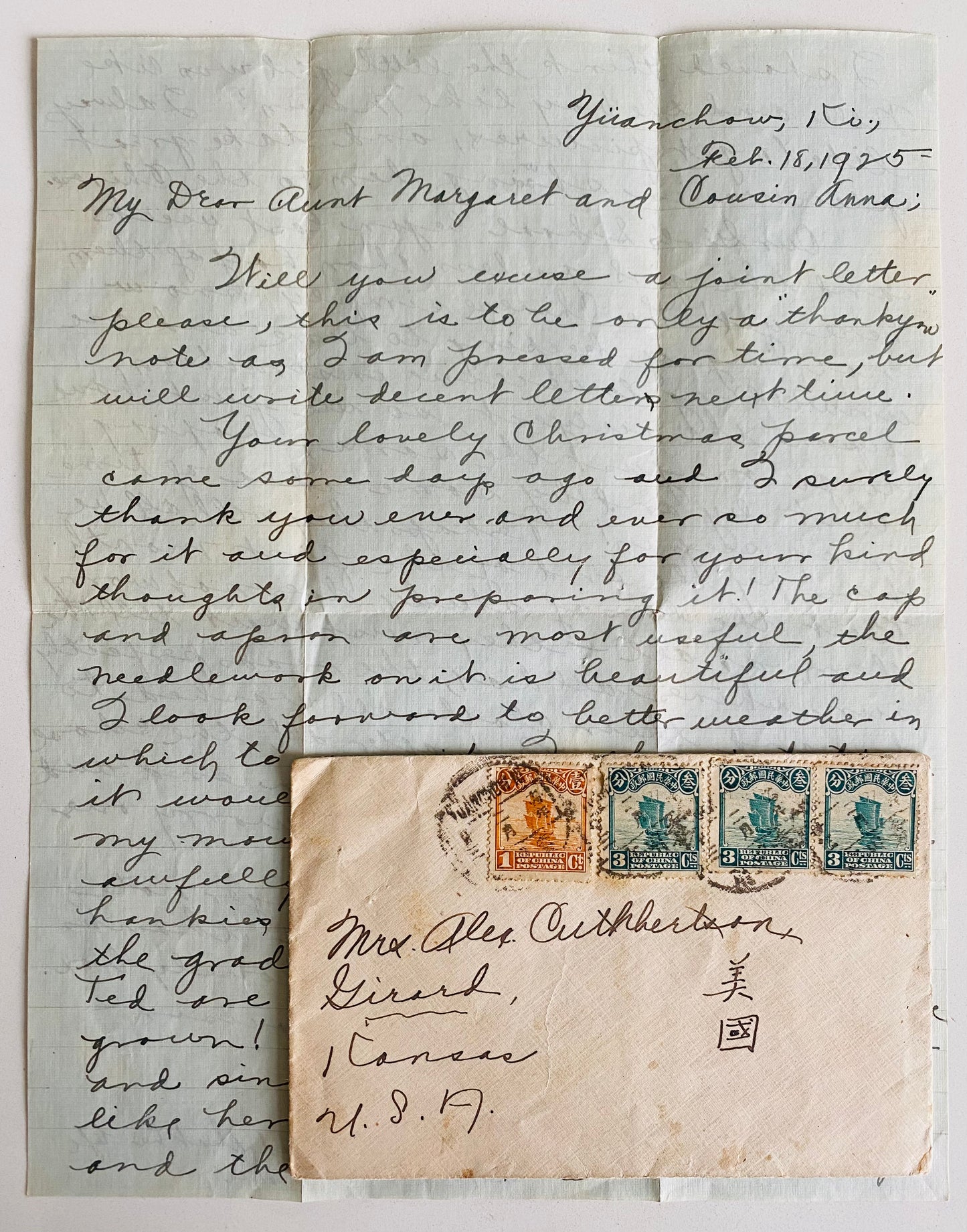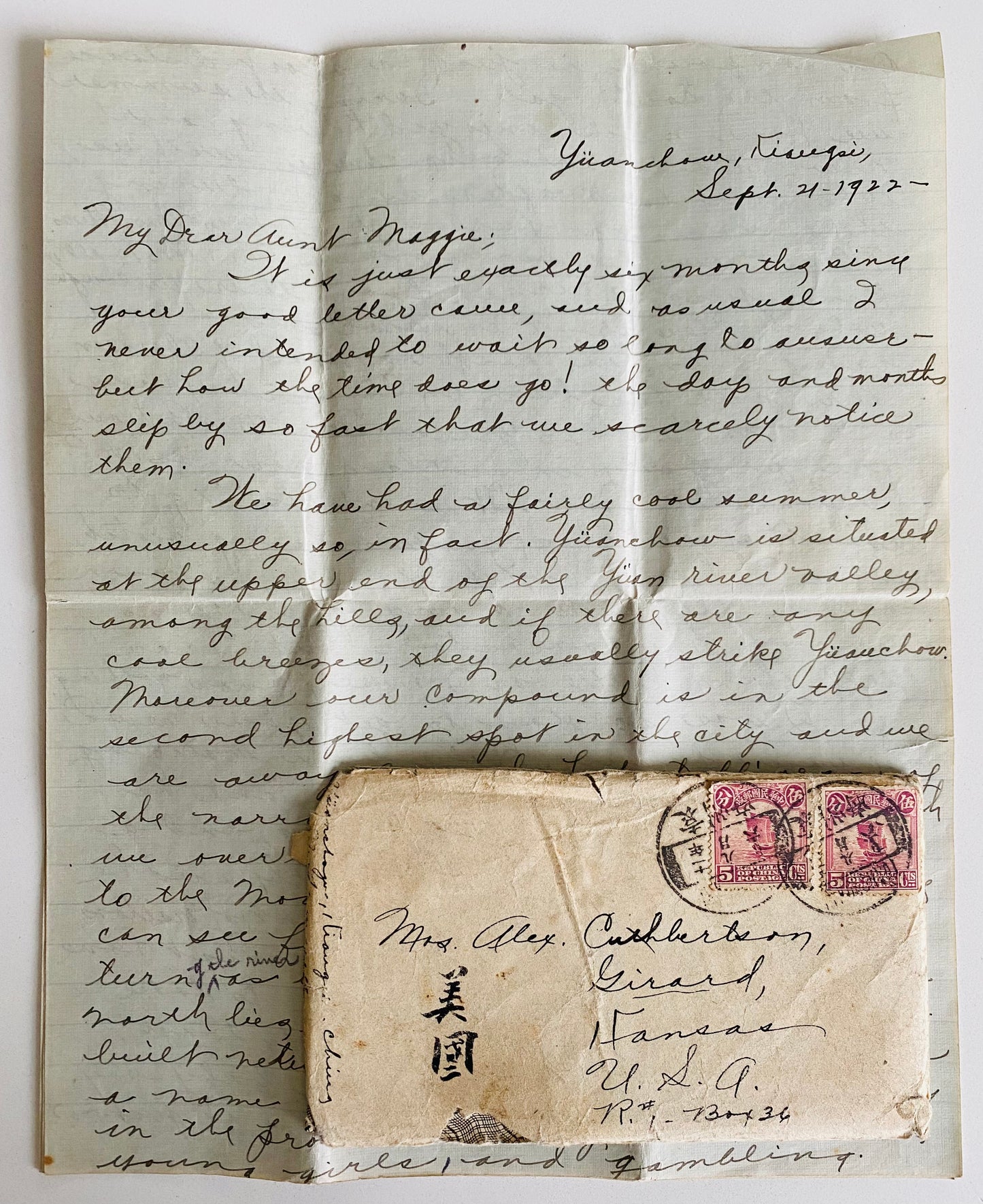Specs Fine Books
1922 CHINA INLAND MISSION. Two Letters by Missionary Kidnapped and Held in Internment Camps
1922 CHINA INLAND MISSION. Two Letters by Missionary Kidnapped and Held in Internment Camps
Couldn't load pickup availability
A wonderful pair of letters from an influential young missionary, Nina Eleanor Gemmell [1895-1983]. Born in 1895, she traveled to China under the auspices of the China Inland Mission, founded by J. Hudson Taylor. She served her entire career in the Kiangsu [Jiangxi] Province near Shanghai.
An incredibly dangerous region, by the end of 1925, the year of her second letter, and then just 30 years old, she had already been captured by bandits for the first time. She was kidnapped again in 1930 by "Communist bandits," backed by the Russians, who blamed missionaries for the ills of China. She, along with the Porteus family [mentioned below] were ransomed back to the mission for $10,000 each. This was reported in the New York Times and other newspapers of the day in an attempt to raise funds.
Then, in the most challenging situation, she was captured by the Japanese while fleeing the country at the onset of the Second World War. She was held at various locations, including Chapei Internment Camp, until her release and repatriation in September of 1943. She was initially arrested on December 8th. It was only a few hours after the attack on Pearl Harbor that Japanese forces began an assault on the Philippines, where Gemmell had fled, hoping to return back to America. The Japanese sequestered Gemmell and other American religious workers there for about 9 months. They witnessed torture and the deadly Bataan Death March in which so many captured American and allied soldiers died.
In September 1942, she was taken by ship to Formosa and then back to Shanghai. There Gemmell remained until her release.
Before her death, she published Through Moongate to China with the OMF, formerly the China Inland Mission. Wheaton's archive holds what they describe as an important report from 1930 to D. E. Hoste from Nina Gemmell regarding the state of missions in Kiangsi.
1. An 8pp ALS datelined to Yuanchow, Kiangsi. September 21, 1922.
Extracts include:
A wonderful, geographical and ethical description of Yuanchow, including its child prostitution:
"Yuanchow is situated at the upper end of the Yuan river valley, among the hills, and if there are any cool breezes, they usually strike Yuanchow. Moreover our compound is in the second highest spot in the city and we are away from the hot stuffiness of the narrow Chinese streets. On the South we overlook the city wall and away to the mountains, beyond to the east we can see far down the valley to the turn of the river as it leaves the basin. To the north lies the city itself - a dirty, closely built network of homes, and it has a name of being the most evil city in the province owing to the trade in young girls, and gambling."
On the ongoing battle for control over Kiangsi and Chinese corruption:
"Our province of Kiangsi is invaded again. This time it is from the South and East, by the Southerners who want to get into power of such a wealthy province. Soldiers are coming and going constantly and no barrows or chairs on vehicles can be borrowed as all are commandeered by the troops. It is the same old story of the greed and avarice of officials who have a few soldiers at their command who strive for places where it is easiest to line their pockets. The present governor has made himself a millionaire many times over and is willing to let his friend come on and have a try too. In the capitol of Peking it is the same. What money filters in never reverts to the people in the form of better roads or philanthropic institutions or even schools, and they are thus enabled to get rich."
On the production of and access to opium:
"Opium culture is encouraged, and demanded in some places, and one sees fields of poppies on every hand. And this is the great temptation for Christians, who can grow it cheaply, and those who used to eat it can now afford to buy it. In one small outstation there are from ten to twenty opium dens being run openly night and day! And nothing is done to prevent it."
An interesting passage hinting at the role of missionaries in empowering the women of China:
"We had our Annual Women's Conference. On Thursday night the women began to come on barrows, in chairs, & walking. It began to rain just as they were arriving so some arrived with their padded quilts soaked. We had fixed beds in the schoolroom in rows, about forty in all. Some of these women had never left their homes before and it was quite an undertaking for them to come even as much as 10 miles away. Several were over 70 years old. One old lady who had been a vegetarian all her life, and on hearing the Gospel had renounced all her vows - had learned a few lines of the Catechism [easy & simple] and was so proud of her achievement."
Content related to the basic tools used to introduce Chinese Christians to their faith and begin discipleship:
"I had 2 classes daily of enquirers and less experienced Christians, teaching them a hymn, 'There is a gate that stands ajar' and a page or two of the Catechism. This is not the Catechism that we once labored to learn, but an easy style for ignorant women. The first 3 are like this:
1. Ques. Who made the heavens & earth? Ans. God made the heavens and earth.
2. Ques. Where did God come form? Ans. God was from the beginning.
3. Ques. Who made man? Ans. God made man.
Some of the dear old ladies went to sleep after studying a quarter of an hour, so they were unable to retain much. Others learned rapidly and learned the whole hymn. The only thing that they were all successful at retaining was the 2 to 4 bowls of rice & vegetables each of them managed to eat at every meal!"
A wonderful piece of commentary on the Chinese view of westerners:
Speaking of their response at the missionary residence: "They like our family pictures best of all, remarking on the physical characteristics of each one, saying I looked like them - which of course I did not, but they think all foreigners look alike. . ."
Also includes:
Mention of important early China Inland Missionaries, Gladstone and Minnie Porteus.
A wonderful little extract, "I do like Chinese food, it is so tasty - can eat 2 or 3 bowls at each meal!"
Mentions magic lantern shows, including the Life of Joseph, Pilgrim's Progress, Mission Work in Other Lands. . .
Baptism of new believers who "know a path of persecution lies before them."
An account of the vitality of the faith of Chinese Christians: "Many other testimonies were given and most of them gave the power of Christ in other lives as their reason for believing."
2. A chattier 2pp ALS datelined to Yuanchow, Kiangsi. February 18, 1925
Contains a brief account of the Girls' School in Yuanchow:
"Our Girls' School began last week and the girls are less than half of them here yet! The Chinese simply know nothing of keeping to time and are unwilling to receive instruction upon the subject, so we just have to go on just the same, hoping that by and by some idea of time may seep in! Perhaps they will all be here by the end of the first month. But the loss of study does not worry them at all - they must wait till the sun shines all day, the roads perfectly dry and their clothes all washed to their liking. But, after all, the school is only a means to an end and after a while one does not worry over it."
Both letters in very good condition.
Share






